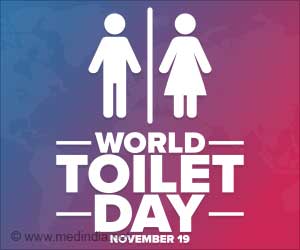World Toilet Day campaign aims to raise awareness about the global sanitation crisis, as more than 3.6 billion people lack access to proper sanitation, and the consequences are devastating.

‘World Toilet Day campaign aims to raise awareness about the global sanitation crisis, as more than 3.6 billion people lack access to proper sanitation, and the consequences are devastating.’





"Yet 3.6 billion people still live without safely managed sanitation, threatening health, harming the environment, and hindering economic development." Lack of proper sanitation can also be lethal. Every day, more than 700 children under the age of five die from diarrhea linked to unsafe water and sanitation, according to UN data.
World Toilet Day, which falls on November 19 annually and has been commemorated since 2013, aims to break taboos and make sanitation for all a global development priority, Xinhua news agency reported.
Toilets save lives and help improve gender equality and society overall, according to the UN Secretary General.
"History teaches us that rapid progress is possible," he said.
Advertisement
Guterres called for urgent and massive investment, as well as innovation, along the entire "sanitation chain," from toilets, to the transport, collection and treatment of human waste.
Advertisement
For every dollar invested in toilets and sanitation, up to five dollars is returned in saved medical costs, better health, increased productivity, education and jobs, the UN Chief said.
This year's theme is about valuing toilets. The campaign draws attention to the fact that toilets -- and the sanitation systems that support them -- are underfunded, poorly managed or neglected in many parts of the world, with devastating consequences for health, economics and the environment, particularly in the poorest and most marginalized communities.
Source-IANS












